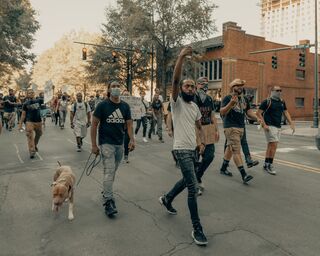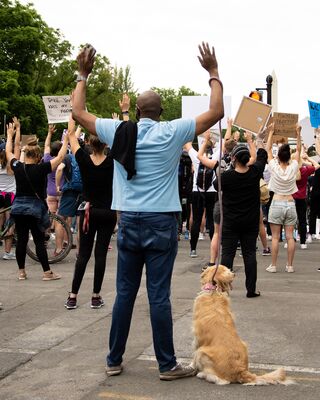Bias
What Does the BLM Movement Have to Do With Animal Rights?
A new book explains why we should look to animals to learn about people.
Posted August 31, 2020

I had the pleasure of speaking with Dr. Benedicte Boisseron, professor of Afroamerican and African Studies at the University of Michigan, about her latest book, Afro-Dog: Blackness and the Animal Question. In her book, she addresses the often-used comparison in animal rights advocacy of the experiences of oppressed people and the mistreatment of animals. She states that the "depersonalization" and "dehumanization" that occurs when people of color are compared to animals not only hurts the people but also puts animals in a precarious position.
Dr. Boisseron recommends that, rather than civil rights and animal rights groups competing against each other, we should be working together to improve the conditions of both marginalized groups. I asked her to explain the concepts in her book in more detail.
Can you tell us more about the title of your book and what it means?
"Afro-Dog" is a neologism inspired by W.E.B. Du Bois’s concept of "double-consciousness" in his book, The Souls of Black Folk. According to Du Bois, Blacks in America, being both American and Black, have “two souls, two thoughts, two unreconciled strivings,” as he says. The hyphen in "Afro-Dog" refers to this split identity, being "African-American," meaning Black and American, while knowing that Black always stands on the margins of Americanness.
As for "dog," I wanted to convey the idea that the construct of "Blackness" in our slavery-impacted history is intrinsically connected to the animal. Being Black is a triple consciousness: American, Black, and less-than-human. The book mainly focuses on the role of dogs in the history of racism; this is why I used this animal as an example of triple-consciousness.
Could you explain why comparing Afro-American studies and animal studies has sometimes been seen as controversial?
Some animal rights activists have been known to compare modern animal cruelty with black slavery or BLM as a way to advocate for animal rights. Think, for example, of the PETA 2020 Superbowl Kaepernick-inspired ad or its 2005 fundraising exhibit entitled “Are Animals the New Slaves.” But if you have Frederick Douglass’s vivid image in mind of slaves and animals being ranked together at the market, side-by-side, one may understand why many black people today may not want to be compared once again with animals, even for an important cause.
In more general terms, the problem with this type of comparison is that it instrumentalizes one cause for the benefit of another, without much regard for the former cause. As I argue in my book, it is indeed crucial to look at entangled forms of oppression, how sexism, racism, racism, homophobia, ableism, and speciesism are interconnected, but one also needs to be mindful of not being driven exclusively by one cause to the detriment of others. Analogies and comparisons can easily become insensitive.

Could you explain how the intersectionality of animal studies and black studies can form "an interspecies alliance against the hegemonic (white, human, patriarchal) voice"?
Again, the point is not to stay clear of the animal question when talking about Blackness since, as we know, historically speaking, the connection between racialization and animalization has been one of the most enduring legacies of slavery and colonization. But to avoid analogies and comparisons, we should think of other forms of inter-species relating, forms that are empowering rather than demeaning.
For example, the ecological concept of commensalism, which is usually restricted to the animal world, when applied to a human context can be experienced as an anti-colonial and anti-hegemonic approach of relating to each other. Commensalism is a relationship between two species not based on profit nor harm, something that you find, as I explain at length in the book, in the Creole culture of the Caribbean and a kind of relation that is clearly anti-hegemonic and anti-colonial.
Although you discuss multiple marginalized groups, your book focuses on the experiences of Blacks in the United States. How do you think your book fits into the current Black Lives Matter movement?
This question goes back to the concept of triple-consciousness, of being all at once, American, Black, and less than human. Frederick Douglass’s image of the ranking of animals and Blacks together in the same chain of Being reminds us that since the inception of America as a slave colony, Blacks have always been experienced as fungible and their lives and pain as dismissible. When Donald Trump uses dog-whistling (literally speaking) during the George Floyd protests, calling on “the most vicious dogs, and most ominous weapons” to subdue protesters, we know that he’s using rhetoric and imagery from the slavery era, when slave owners used dogs to chase runaway slaves running to their freedom.
It’s recurrent rhetoric that we have also seen during the civil rights movement with fire hoses and police dogs attacking black protestors. Dogs have always been used against Blacks seeking freedom and equal rights. What Afro-Dog is trying to say is that when we talk about Black defiance, animal weaponry is never far behind. It is a particularly relevant lesson as we see the Black Lives Matter movement gaining momentum in those times of police brutality, racial reckoning, and protests.
How does your book relate to your personal background and general areas of interest?
I’ve always worked on dogs for personal reasons too. I was born and raised in France from a French mother and French-Caribbean father. We’ve always had a German shepherd at home.
My dad never related to our dogs the way my mom or us children did. Once my parents moved to the French Caribbean island of Guadeloupe, it all came together. I understood the weight of history and its impact on my dad’s relationship with dogs.
My areas of expertise are the Black Atlantic, Race Theory, Francophone and Caribbean Studies, and African-American studies. With the animal question, I felt like everything came together; you could trace the impact of slavery through the animal question from France, to the Caribbean, to America. The animal question is this common denominator.
Your book is fascinating because it not only is based on historical facts and philosophy, but it is written with a critical race theory perspective. Who is your intended audience for this book?
Hopefully, this book can appeal to not only scholars and students but also a general audience interested in issues about Blackness, anti-racism, animal rights, literature, philosophy, and history.
Could you explain to the readers about the relationship between Black people and cats?
In my book, I only look at cats in a philosophical way. I don’t know much about cats per se. I would be curious to know if someone ever looked at real relationships between cats and Blacks. Dogs and Blacks, yes, there are various books, essays, and blogs about it, but cats I don’t know.
In my book, the cat relates to French philosopher Jacques Derrida. “The Animal that Therefore I Am” is a brilliant essay in which Derrida describes the phenomenological experience of noticing for the first time that his pussy cat is looking at him naked in the bathroom. Prior to that moment, the philosopher took the feline presence in his house for granted. Yet, as he becomes aware of the animal gaze, he also becomes self-conscious, wondering if the cat thinks and what she may think of him.
This is an essay about vulnerability, about the gaze switching, and the power dynamic too. French philosopher Jean-Paul Sartre talked about the same kind of vulnerability and the return of the gaze in the context of Black literature. What happened the first time a slave told his story in American, or a black poet opened up about the horrors of colonization in a French context? The slave owner and the colonizer became aware for the first time of being looked at and judged.
Is there anything else you'd like to tell readers?
I’m currently working on a new project related to Afro-Dog, though of a much more personal nature. It is a memoir in essays about black freeganism. Freeganism is very much like commensalism, a lifestyle that tries to rely on resources readily available. A freegan is someone who lives a life away from a logic of profit and transactions by dumpster-diving, repurposing, and reclaiming. I have an essay coming out in Transition Magazine entitled “Neither White Nor Black, but Some Sort of Freegan.”
References
Boisseron, B. (2018). Afro-Dog: blackness and the animal question. Columbia University Press.




